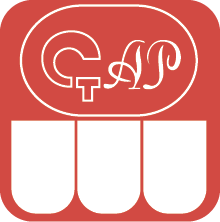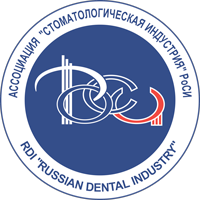DOI:
10.37988/1811-153X_2023_4_102A method of preserving alveolar bone parameters after tooth removal using a tooth root fragment: a clinical case
Downloads
Abstract
Various osteoplastic materials for the conservation of sockets of extracted teeth are actively using to preserve the volume of bone tissue before installing of dental implants. In particular, materials from extracted teeth are used: ground dentin matrix, dentin blocks and fragments of extracted teeth. The purpose of this work is to show the advantages of the technique of preserving the sockets of extracted teeth with a blood clot and a root fragment over platelet concentrate (PRGF).Materials and methods.
A 30-year-old patient had failed teeth 1.8, 2.8, 3.8, 3.6 and 4.6 removed in preparation for implantation. The socket of tooth 3.6 was preserved with a blood clot and a fragment of the root of tooth 1.8. The socket of tooth 4.6 was preserved with PRGF from the patient's venous. After 4 months, alveolar ridge resorption in the area of extracted teeth 3.6 and 4.6 was compared.
Results.
After 4 months, the loss of bone tissue around the socket, preserved with a fragment of the tooth root, was 2% in height and 10% in width compared to the initial volume. In the socket area where PRGF was used for preservation, the loss was 16% in height and 37% in width. The primary stability of the implants installed in the resulting bone regenerate in both cases exceeded 30 N·cm. At the same time, the density of newly formed bone tissue obtained using a fragment of a tooth root turned out to be higher than when using PRGF.
Conclusion.
A tooth root fragment is an effective and safe material for preserving the parameters of the alveolar ridge of the jaws in the preimplantation period.
Key words:
patient’s extracted tooth, socket preservation, tooth root fragment, dental implantation, PRGFFor Citation
[1]
Le T.H., Drobyshev A.Yu., Redko N.A., Zairatyants O.V., Plekhanova E.N. A method of preserving alveolar bone parameters after tooth removal using a tooth root fragment: a clinical case. Clinical Dentistry (Russia). 2024; 26 (4): 102—107. DOI: 10.37988/1811-153X_2023_4_102
References
- Tan W.L., Wong T.L., Wong M.C., Lang N.P. A systematic review of post-extractional alveolar hard and soft tissue dimensional changes in humans. Clin Oral Implants Res. 2012; 23 Suppl 5: 1—21. PMID: 22211303
- Thalmair T., Fickl S., Schneider D., Hinze M., Wachtel H. Dimensional alterations of extraction sites after different alveolar ridge preservation techniques a volumetric study. J Clin Periodontol. 2013; 40 (7): 721—7. PMID: 23647007
- Balli G., Ioannou A., Powell C.A., Angelov N., Romanos G.E., Soldatos N. Ridge preservation procedures after tooth extractions: A systematic review. Int J Dent. 2018; 2018: 8546568. PMID: 30057608
- MacBeth N., Trullenque-Eriksson A., Donos N., Mardas N. Hard and soft tissue changes following alveolar ridge preservation: a systematic review. Clin Oral Implants Res. 2017; 28 (8): 982—1004. PMID: 27458031
- Tsitsiashvili A.M. Comprehensive treatment of patients with partial absence of teeth when using dental implants in conditions of a limited amount of bone tissue: master`s thesis. Moscow, 2020. 336 p. (In Russian).
- Red'ko N.A., Drobyshev A.Yu., Lezhnev D.A. Socket preservation during preimplantation period: Effi cacy of osteoplastic material application using cone beam computed tomography. Kuban Scientific Medical Bulletin. 2019; 6: 70—79 (In Russian). eLIBRARY ID: 41504339
- Stumbras A., Galindo-Moreno P., Januzis G., Juodzbalys G. Three-dimensional analysis of dimensional changes after alveolar ridge preservation with bone substitutes or plasma rich in growth factors: Randomized and controlled clinical trial. Clin Implant Dent Relat Res. 2021; 23 (1): 96—106. PMID: 33084205
- Neumeyer S. The Tissue Master Concept (TMC): innovations for alveolar ridge preservation. Int J Esthet Dent. 2017; 12 (2): 246—257. PMID: 28653054
- Kulakov A.A., Badaljan V.A., Apojan A.A., Elfimova N.V., Stepanjan Z.M. Experience of using the technique of preserving the volume of the alveolar bone by using a fragment of the removed tooth to close the alveolar socket in a patient with chronic apical periodontitis. Clinical Dentistry (Russia). 2018; 4 (88): 22—25 (In Russian). eLIBRARY ID: 36517609
- Bruhnke M., Bitter K., Beuer F., Böse M.W.H., Neumeyer S., Naumann M. Tooth preservation of deeply destroyed teeth by forced orthodontic extrusion: A case series. Quintessence Int. 2022; 53 (6): 522—531. PMID: 35119237
- Bäumer D., Zuhr O., Rebele S., Hürzeler M. Socket shield technique for immediate implant placement clinical, radiographic and volumetric data after 5 years. Clin Oral Implants Res. 2017; 28 (11): 1450—1458. PMID: 28333394
- Redko N.A., Drobyshev A.Yu., Deev R.V. Bone regeneration in the sockets of extracted teeth using an autologous dentin matrix. Genes and Cells. 2020; 3: 114—119 (In Russian). eLIBRARY ID: 46126529
- Le T.H., Drobyshev A.Yu., Redko N.A., Tsarev V.N., Podporin M.S. Efficiency of antiseptic agents for treatment of autogenous dentinal blocks. Russian Journal of Dentistry. 2023; 3: 219—228 (In Russian). eLIBRARY ID: 54367785
Downloads
Received
August 2, 2023
Accepted
November 26, 2023
Published on
January 16, 2024









